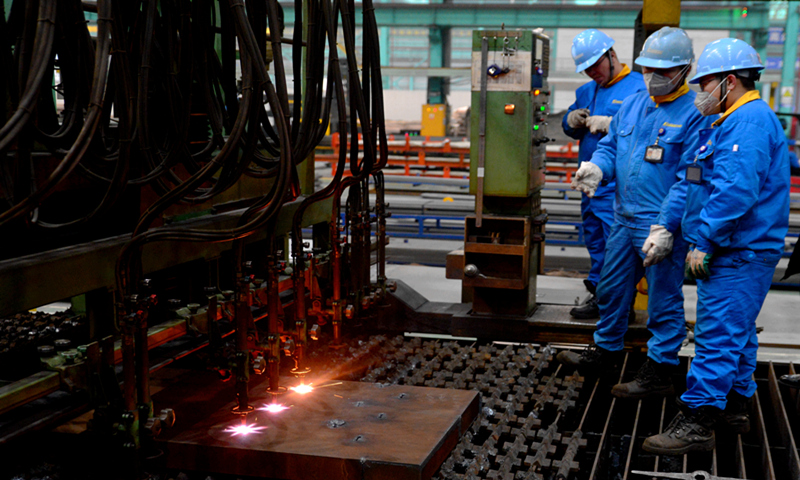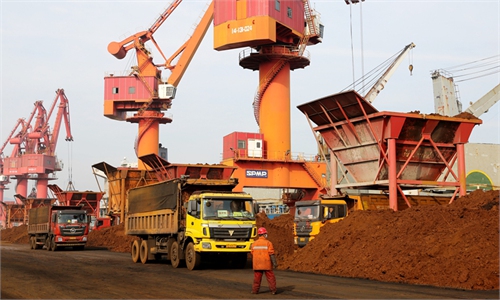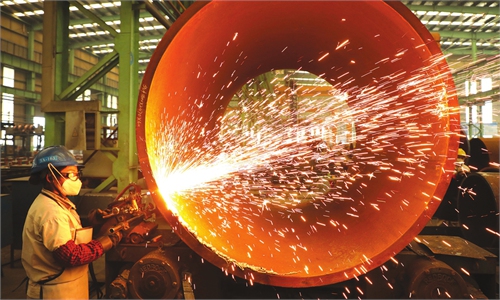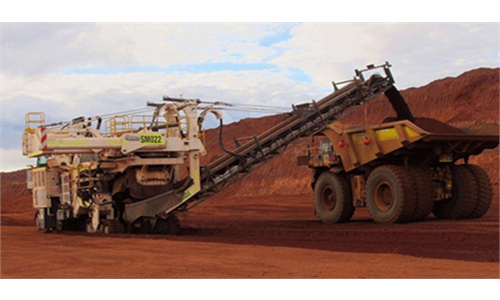Rising steel prices and surging demand in China aren't helping the profits of steel mills
Analysts call for China to strive for a greater say in iron ore market

Workers observe the operation of flame cutting equipment at a steel products enterprise in Jingjiang industrial park in Taizhou, East China's Jiangsu province on December 23, 2020. Photo: VCG
Rising steel prices and surging demand in China aren't helping the profits of steel mills, which are grappling with surging iron ore prices amid a post-virus economic recovery, Chinese analysts said on Tuesday, noting that the situation is an alarming call for China to strive for a greater say in iron ore prices.
The price of cold-rolled sheet, used in manufacturing and the vehicle sector, rose to 5,605 yuan ($867.58) per ton on Monday from last year's low of 3,773 yuan per ton on April 29, data from the Beijing Lange Steel Information Research Center showed.
Jiang Zhou, deputy general manager at the commodity center at Guoyuan Port in Southwest China's Chongqing Municipality, told the Global Times on Tuesday that steel prices have soared since mid-December, only to show signs of being tamed in recent weeks.
"There has been a spike in steel prices as demand soared, with a recovering domestic manufacturing industry, automotive sector and state-backed infrastructure projects fueling rising demand for steel," Jiang said.
But supplies are being choked as some steel mills upgrade their production facilities, causing lower-than-usual output, Jiang noted.
Chinese factories are the busiest they've been since the coronavirus crippled many factories abroad. In November, exports were up 21.1 percent year-on-year, the fastest pace since February 2018.
However, Chinese industry experts say that China's steel mills are not getting higher profits from the rising steel prices.
Wang Guoqing, research director at the Beijing Lange Steel Information Research Center, said that it means the added value created by Chinese steel mills is almost entirely grabbed by the iron ore suppliers, and downstream Chinese companies have ended up paying more to maintain their production.
On Monday, leading steel producer Baoshan Iron & Steel Co said it is raising the factory-gate price of cold-rolled sheet by 400 yuan per ton starting from February.
Affected by surging cold-rolled sheet prices, home appliance makers in China have faced higher production costs, Wang said. Many have told retailers about plans for higher prices, according to media reports.
To address the debacle, the Chinese government recently proposed plans to encourage the development of domestic iron ore mines, use more scrap steel as a raw material, and increase investment in overseas iron ore mines.
China, as the world's top steel producing country, has a certain degree of bargaining power with the world's iron ore suppliers, which have a high level of resource concentration with Australia as a key exporter.
After the China Iron and Steel Association expressed concern over runaway iron ore prices with leading suppliers including Rio Tinto in mid-December, prices were briefly tamed.
However, Chinese steel mills are not in an advantageous position in their talks with iron ore suppliers, and prices have surged back. On Monday, the Platts iron ore index price stood at $171.1 per ton, up 29.3 percent from end-November levels.
Amid a global pandemic that crippled production and the fast recovering Chinese manufacturing sector, China's steel exports declined drastically as the price advantage waned.
Wang estimated that China's steel exports reached 53 million tons in 2020, down 16 percent and the lowest level since 2015, when the country exported 112.39 million tons of steel.
Steel imports will likely rise by 60 percent to 20 million tons, Wang noted, based on customs data for the January-November period.




